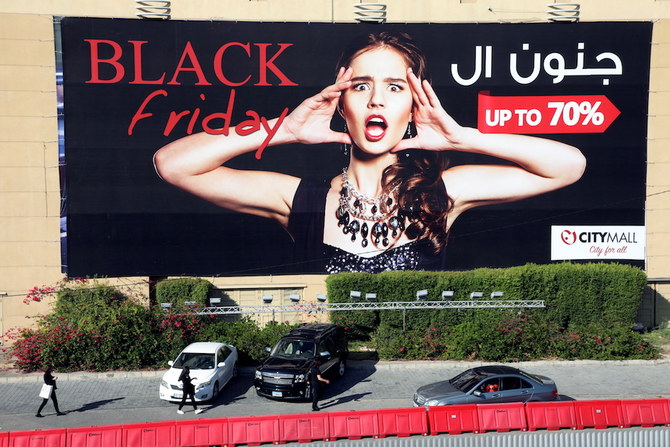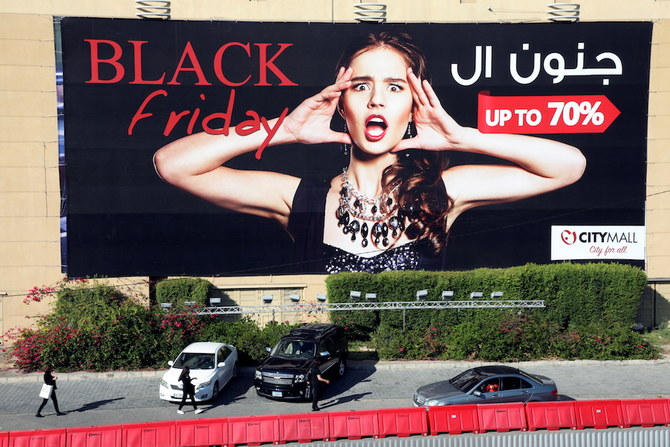BEIRUT: Black Friday promotions in Lebanon that flooded social media seem to have failed to attract customers as the Lebanese pound hit a new low amid a worsening economic and political stalemate.
The currency was trading at 25,000 Lebanese pounds to the dollar on the black market on Friday. A further devaluation seems imminent amid the political instability.
Although many stores have extended the sales for the entire weekend, several people who headed to shops in search of good deals said: “It’s a hoax.”
Hassan, an engineer, said: “I went to a well-known appliance store where people used to queue for hours to be able to get in during previous Black Friday sales. The prices are much higher than the original brand stores. I left without buying anything.”
The minimum wage is now no more than $30, amid worsening economic conditions.
The head of the Beirut Traders’ Association, Nicolas Chammas, said: “It is too early to assess Black Friday sales. We need to wait until next week to see to what extent people’s purchasing power has declined.”
On Friday, the Central Bank warned against mobile applications offering exchange rates on the black market: “These are suspicious, illegal applications. Still, they are determining the exchange rate but do not reflect the reality.
“Rates change day and night, every day of the week, even during holidays; as if the parallel market is an organized market in the form of a stock exchange.
“Those operating these applications are serving other political and commercial interests. The judicial and security authorities have sought to control these applications at the request of the Lebanese government. Since many of them are based outside Lebanon, the Central Bank has demanded that international internet companies remove these applications from their networks.”
The Central Bank said that “the real exchange rate is announced daily by the Central Bank based on the current trading in the market, registered on Sayrafa platform.
“The Central Bank will follow up on this matter internationally and will hold companies such as Google, Facebook and others responsible for the harm these applications have on Lebanon and demand that they publish the official rate and the Sayrafa rate only.”
Activists expressed anger on social media, complaining about the absence of any prospect for political and economic solutions.
Some mocked the authorities for blaming the internet for the devaluation of the Lebanese pound: “Is cutting the internet the solution?”
In another sign of a worsening financial crisis, a small group of protesters broke into the Ministry of Social Affairs building near the Justice Palace in Beirut.
They removed a picture of President Michel Aoun, hung it upside down, then placed a banner over it bearing the slogan of the October 17 Revolution.
Protesters who entered the hall next to the office of the minister, Hector Hajjar, demanded that “an emergency operations room should be set up to address the unbearable living conditions.”
Hajjar demanded that the president’s picture be hung properly before agreeing to speak with the protesters.
One protester said: “I had to pay 600,000 Lebanese pounds in the pharmacy for a box of baby formula and two boxes of fever reducers. I get scared whenever I see my children walking barefoot around the house. I cannot afford to pay for medications if they get sick.
“My entire salary is the equivalent of three boxes of baby formula. What can I do? What happened to the ration card? Is the state waiting for us to die to take action?”
“We are consulting with the World Bank, the Ministry of Finance and Prime Minister Najib Mikati regarding financing the ration card, and I am part of the negotiations,” Hajjar said.
“Over 11 years, the ministry was able to provide support to 36,000 families,” he said.
“We will now start paying in US dollars instead of Lebanese pounds. We will visit 75,000 families and give about $12 million to the poorest. The money is an international grant,” said the minister.
















